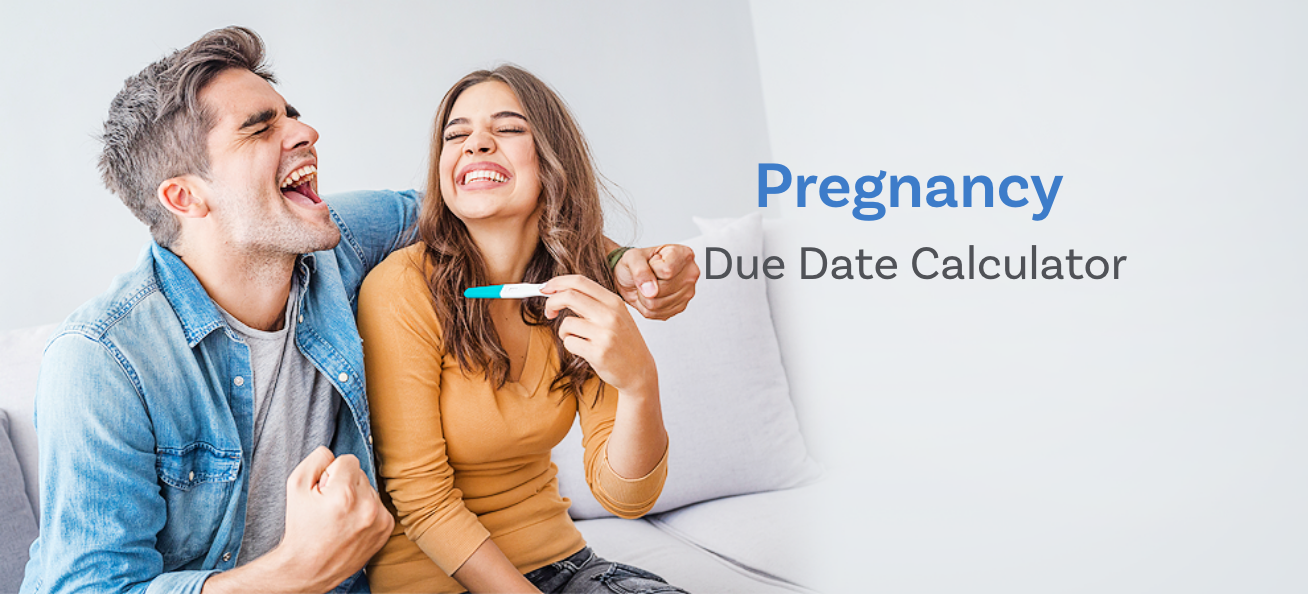Happiness is on its way!
Use the Pregnancy Due Date Calculator to estimate your due date and find out how far along you are!
Frequently Asked Questions
The pregnancy due date calculator will provide an estimated date when your baby is likely to arrive. The due date can be calculated on the basis of your last period date.
To get your due date results using the pregnancy calculator, you need to follow three simple steps. Figure out the first day of your last period. Enter the date into the calendar. Enter the length of your menstrual cycle and hit the NEXT button to find out the expected due date.
The best time to take a pregnancy test is after you have missed your period. If your fertility calendar is regular, you can take a pregnancy test one week after you have missed your period. If you have an irregular menstrual cycle, you should take a test only after you have passed the longest menstrual cycle that you usually have.
In case you do not want to wait until a missed period, you should at least wait for one or two weeks after you have had unprotected sex with your partner. Successful implantation of an egg takes 7-12 days. The development of HCG also needs time. If you take a pregnancy test too early, you may receive an inaccurate result.
Although you can take a pregnancy test at any time of the day, taking a test in the morning is likely to give an accurate result.
The pregnancy due date calculator is designed to calculate your delivery date based on the first day of your last periods.
The most common and reliable way to calculate your pregnancy due based on your last menstrual period (LMP) is by adding 7 days to your LMP and then counting 9 months from the particular date.
The calculation takes into account the menstrual cycle of 27-32 days.
Women typically ovulate two weeks after their menstrual cycle starts. And, for most women, it is easier to remember the LMP date than their ovulation date.
For example: If the first date of your last periods is 1st January 2021, and your menstrual cycle is of 30 days, your estimated due date will be 8th October 2021.
First day of last menstrual period
Most pregnancies last for 40 weeks. So, one of the easiest ways to estimate your pregnancy due date is to count 40 weeks or 380 days from the first day of your last menstrual period.
While this date is the closest that can come to your delivery, it is absolutely normal to deliver a week or two before and after the due date.
Once your pregnancy is confirmed, the next thing that you’d want to know is your due date. Everybody in your close circle wants to know when is the baby arriving. From the moment your pregnancy is discovered, everybody looks forward to your baby’s arrival.
Once you know your due date, it can help you as well as your family members to prepare for the baby’s arrival. Knowing the baby’s due date helps the parents monitor the baby’s growth more accurately. There are many tests that change throughout pregnancy. Knowing the due date can help the healthcare provider and the parents keep a track of these tests and to manage preterm labour.
The result of the pregnancy due date is the closest to your delivery date in real, but not always the accurate one. Good prenatal care is vital for your pregnancy and your week-by-week fetal development. There are multiple factors that can affect your estimated pregnancy due date.
Common factors affecting pregnancy due date include the mother’s age and health, rate of progesterone rise, length of pregnancy in previous births. Woman getting pregnant for the first time are likely to go into labor a few days past the due date. But if a woman has previously delivered a baby around 41 weeks, it is likely that her current pregnancy due date would also be around 41 weeks.
There are also women who are at risk of preterm labor. Risk factors for premature babies include high blood pressure, smoking, previous preterm birth, and diabetes.
- See your doctor at the earliest. Good prenatal guidance is necessary for you and your baby. If you haven’t chosen an On-Gyn yet, get started now.
- Aim to eat well and eat healthily. Eat at least five portions of vegetable and fruits. Have protein and dairy products.
- Boost your iron levels. The body needs iron to produce haemoglobin to carry oxygen to the other tissues and organs of the body.
- Take the necessary supplements. Folic acid supplements are important for at least the first three months of the pregnancy to reduce the risk of the baby developing a neural tube defect.
- Eliminate toxins from your body. Toxins of any form are linked to birth defects, miscarriages and other health complications.
- Welcome good vibes. Happiness and positive vibes are extremely healthy for the baby. Surround yourself with people and vibes that make you happy.





